IR Film Review: THE INVISIBLE MAN [Universal]
The narrative progression of an IP like "The Invisible Man" can take perspective elements on the notion of existence and what it means to be alive. In approaching it in the Blumhouse model, it forces the filmmaker to find that differing approach. Leigh Whannel, known for the SAW Franchise with James Wan, seemed to have figured out something very specific when he made "Upgrade" a couple years ago which premiered at SxSW. He spoke about the difference about having one car for a car chase instead of 10. Working with less makes you approach different things creatively. While this might seem restrictive for some filmmakers who have already made their name, it is also freeing (depending on financial responsibility on who succeeds monetarily with this frugalness)."The Invisible Man" is much better than it has any right to be but that is because of the committed nature of Elizabeth Moss and Whannel knowing how to work with cinematic perspective for much of the movie without anything really being there...but also knowing not to pull the punches when need be. Despite any genre trappings, there is an emotional resonance with Moss. She gets tossed around but these kind of damaged personas that burgeon to a vicious streak at times make her perfect, giving her that character actor edge. She made "The Kitchen" work at points because she went for it. It is not that her character has abandon, she just fully commits to it. While some might point to an element of overacting, it is a style that works primarily well in these types of films...and Moss knows it.One crucial point in the film, Whannel does something interesting between the trailer and the actual film which acts to a point of misdirect without even adhering to the big reveal...and it hits hard in that moment to audible gasps. The set pieces feel familiar but also original which is also helped by the fact that the story is set in San Francisco and Silicon Valley yet it was shot in Australia and near Fox Studios Sydney so it has that movie feel of being real but not quite. The continuation of what "The Invisible Man" actually is, of course, reflective of the times but doesn't make it a matter of scolding, just a state of being. Moss' character wants to escape an abusive relationship but it is coming to terms with both the mental and physical strain that resides in how she sees herself.When the genre elements finally kick in, that sense of identity is nicely teetering, especially in one scene after a betrayal of sorts when she is sitting on the floor with a knife in hand staring at an empty room, ruminating on the aspect of why she specifically exists in this space. It may be exposition but it rings heartfelt which makes the next scene really take the fight to a more practical level and thereby makes it more intense. Moss again is great at these points selling them wholesale. The antagonist(s) themselves are fairly thinly drawn, but that angle of the story is not so much central as is the notion of paranoia and control which is very finely detailed."The Invisible Man" is an interesting reverse psychology exercise into the diatribe that permeates our times. From the opening credits that tease a noir in certain respects, this approach to the Universal Monster Universe is the correct one: lower budget, using story and acting instead of overarching effects and the essence of psychology which is what made the mid budget films of yesterday so compelling, Making something dynamic is not so much the sum of its parts, but that essence of work between the lines in that what cannot be seen often is scarier than what is right in front of you.B+
By Tim Wassberg





